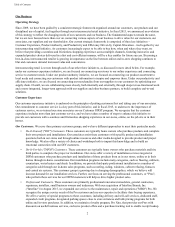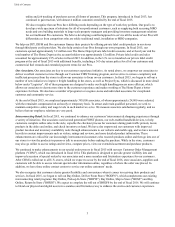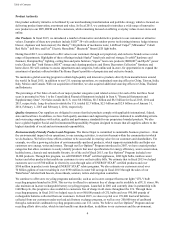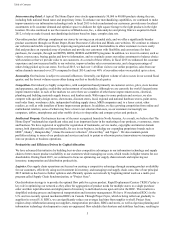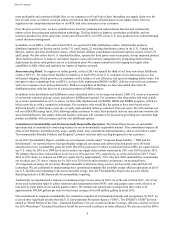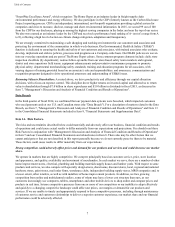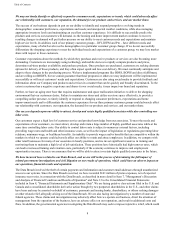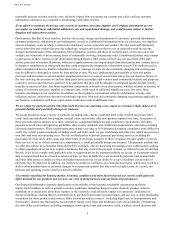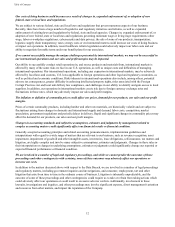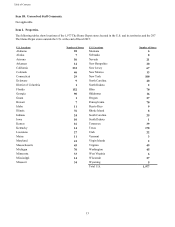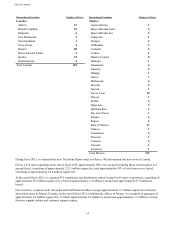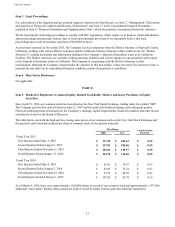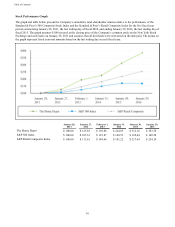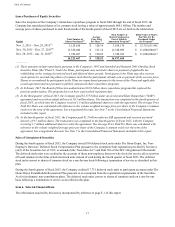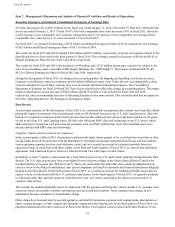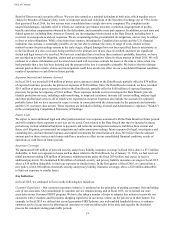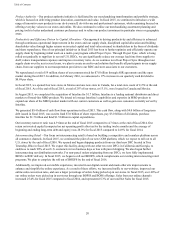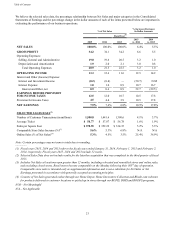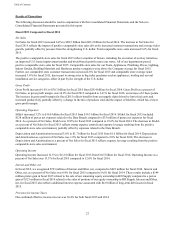Home Depot 2015 Annual Report Download - page 14
Download and view the complete annual report
Please find page 14 of the 2015 Home Depot annual report below. You can navigate through the pages in the report by either clicking on the pages listed below, or by using the keyword search tool below to find specific information within the annual report.Table of Contents
12
Our costs of doing business could increase as a result of changes in, expanded enforcement of, or adoption of new
federal, state or local laws and regulations.
We are subject to various federal, state and local laws and regulations that govern numerous aspects of our business.
Recently, there have been a large number of legislative and regulatory initiatives and reforms, as well as expanded
enforcement of existing laws and regulations by federal, state and local agencies. Changes in, expanded enforcement of, or
adoption of new federal, state or local laws and regulations governing minimum wage or living wage requirements; other
wage, labor or workplace regulations; cybersecurity and data privacy; the sale of some of our products; transportation;
logistics; supply chain transparency; taxes; energy costs or environmental matters could increase our costs of doing business
or impact our operations. In addition, recent healthcare reform legislation could adversely impact our labor costs and our
ability to negotiate favorable terms under our benefit plans for our associates.
If we cannot successfully manage the unique challenges presented by international markets, we may not be successful in
our international operations and our sales and profit margins may be impacted.
Our ability to successfully conduct retail operations in, and source products and materials from, international markets is
affected by many of the same risks we face in our U.S. operations, as well as unique costs and difficulties of managing
international operations. Our international operations, including any expansion in international markets, may be adversely
affected by local laws and customs, U.S. laws applicable to foreign operations and other legal and regulatory constraints, as
well as political and economic conditions. Risks inherent in international operations also include, among others, potential
adverse tax consequences, greater difficulty in enforcing intellectual property rights, risks associated with the Foreign
Corrupt Practices Act and local anti-bribery law compliance, and challenges in our ability to identify and gain access to local
suppliers. In addition, our operations in international markets create risk due to foreign currency exchange rates and
fluctuations in those rates, which may adversely impact our sales and profit margins.
The inflation or deflation of commodity prices could affect our prices, demand for our products, our sales and our profit
margins.
Prices of certain commodity products, including lumber and other raw materials, are historically volatile and are subject to
fluctuations arising from changes in domestic and international supply and demand, labor costs, competition, market
speculation, government regulations and periodic delays in delivery. Rapid and significant changes in commodity prices may
affect the demand for our products, our sales and our profit margins.
Changes in accounting standards and subjective assumptions, estimates and judgments by management related to
complex accounting matters could significantly affect our financial results or financial condition.
Generally accepted accounting principles and related accounting pronouncements, implementation guidelines and
interpretations with regard to a wide range of matters that are relevant to our business, such as revenue recognition, asset
impairment, impairment of goodwill and other intangible assets, inventories, lease obligations, self-insurance, tax matters and
litigation, are highly complex and involve many subjective assumptions, estimates and judgments. Changes in these rules or
their interpretation or changes in underlying assumptions, estimates or judgments could significantly change our reported or
expected financial performance or financial condition.
We are involved in a number of legal and regulatory proceedings, and while we cannot predict the outcomes of those
proceedings and other contingencies with certainty, some of these outcomes may adversely affect our operations or
increase our costs.
In addition to the matters discussed above with respect to the Data Breach, we are involved in a number of legal proceedings
and regulatory matters, including government inquiries and investigations, and consumer, employment, tort and other
litigation that arise from time to time in the ordinary course of business. Litigation is inherently unpredictable, and the
outcome of some of these proceedings and other contingencies could require us to take or refrain from taking actions which
could adversely affect our operations or could result in excessive adverse verdicts. Additionally, involvement in these
lawsuits, investigations and inquiries, and other proceedings may involve significant expense, divert management’s attention
and resources from other matters, and impact the reputation of the Company.


